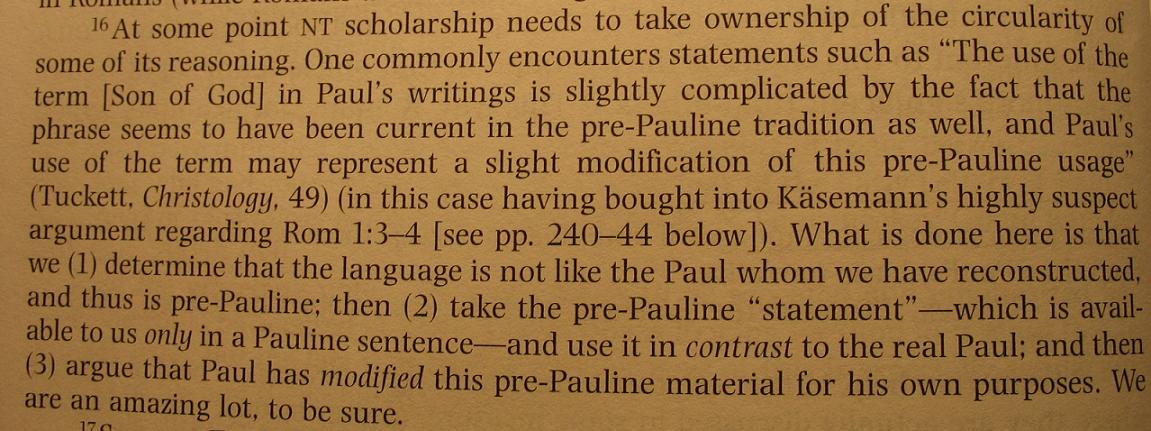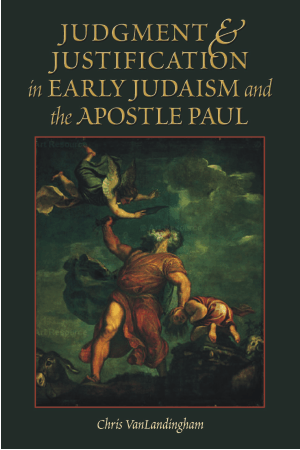My thanks to the kind folk at Hendrickson for a review copy of Chris VanLandingham's Judgment and Justification in Early Judaism and the Apostle Paul
(Peabody, Mass: Hendrickson, 2006).
I've been harping on about VanLandingham's (hereafter VanL) book for some time now, and I have noticed with little surprise the high level of interest the book has provoked. Why am I not surprised? Quite simply because of the breathtaking boldness of VanL's claims! It is not without ground that A. Das reviews VanL's thesis as 'stunningly provocative' noting that VanL calls for 'a complete overhaul in our understanding of both Second Temple Judaism and Paul'. This is indeed a uniquely thought-provoking, daring and challenging book – but is it convincing? It is difficult to offer a worthwhile response in so few words, but before I submit my answer to this question (in the second part of this review), his arguments first need to be overviewed. Buckle up, as this will be quite a ride.
Besides the introduction and conclusion, the book consists of four long chapters consisting of extensive engagement with the primary material. While noting the difficulties involved in this study, the problem the book addresses is the 'relationship between divine grace and human reward as these two concepts relate to an individual's eternal destiny within the writings of Early Judaism and the Apostle Paul' (1). Indeed, anyone with only a basic familiarity with Paul's letters will notice the apparent tension between such topics as grace, mercy, predestination and justification by faith, on the one hand, and Paul's clear statements of judgment according to works, on the other. For example, in 2 Cor 5:10 Paul writes: 'For all of us must appear before the judgment seat of Christ, so that each may receive recompense for what has been done in the body, whether good or evil.' After reviewing the scholarly responses to this problem, VanL maintains that their suggestions 'still have not come to terms with how a forensic justification by faith can be reconciled with a judgment according to deeds' (15). Instead, VanL has his own very original thesis to propose as a solution to this supposed problem, one which he pursues is in critical dialogue with E. P. Sanders and his notion of covenantal nomism, and particularly Sanders' notion 'that in Palestinian and Diasporic Judaism obedience does not earn God's grace, election, or "salvation"' (15).
In chapter one, VanL takes to task Sanders' thesis that 'salvation is given graciously by God in his establishing the covenant with the fathers ... [that] salvation cannot be earned ... [and that one] can never be righteous enough to be worthy in God's sight' (cf. the citation from Sanders on pp. 15-16). Against this, VanL argues that election 'is not a gift of God's grace, but a reward for proper behaviour' (18). Indeed, he finds the concept of 'divine grace remarkably absent in Jewish accounts of Abraham's election' (16). God elected Abraham because of his righteousness. It will of course be responded that the election of Abram in Gen 12 doesn't supply any reason for God's promise. However, in the post-biblical texts, this election was understood as a response to Abraham's righteousness.
This leads to a discussion concerning the nature of the other covenants God made with people. In each case, VanL argues, human obedience is the cause and the covenant the result. VanL's thesis is not simply about finding the odd verse in support of this argument, but rather to determine the general thrust of the entire literary evidence. So he can dismiss the odd verse or chapter (e.g. Ezek 16 – noted on p. 65) that seems to contradict his view as simply a minority view and not representative of the general nature of these texts. Furthermore, unlike earlier works, VanL doesn't thus understand second Temple Judaism negatively, but he rather sees himself as an apologist of the fairness of the justice inherent in these views (cf. e.g. 35-36, 64). God's mercy is thus vindicated from the charge of arbitrariness.
In chapter two, VanL turns from the beginning of the process leading to eternal life (election) to the end of the process, namely judgment. He argues that the Deuteronomic blessings and curses and the associated promises of life and death are, in the Jewish texts of the Greek and early Roman periods, taken to refer to eternal life / damnation. This leads to the straightforward conclusion that one's eternal destiny depends upon obedience; 'God never shows mercy toward the wicked or unrepentant' (77). This is consistent throughout a large variety of texts and 'the extent that God's mercy is discussed, it simply refers to God's salvation, not the reason for it' (17). Eternal destiny has nothing to do with being a simple member of God's covenant people, but rather obedience. VanL further argues that covenantal nomism further flounders on the rocks of the rather extensive pessimistic anthropology and widespread notion that most Jews will be damned, in these Jewish texts.
Turning to Paul's letters, chapter three extends the discussion of chapter two concerning the criterion for receiving eternal life. VanL maintains that Paul's letters evidence the same burden of the previously examined Jewish material, namely that eternal destiny hinges on nothing other than obedience. Because '[e]ternal destiny is the primary issue at the Last Judgment' (176), as in the material examined in the previous chapter, it is possible that God will reject believers (here believers in Christ) at the judgment if their works are not sufficient. If 'justification by faith refers to an acquittal at the Last Judgment, which one receives proleptically at the time of faith in Christ, then one should expect some hint of this idea in the Pauline judgment passages. This idea, however, remains absent in those very judgment passages where his notion of justification by faith should have some imprint' (176), at least if the forensic interpretations of justification are to be believed. VanL grounds his view primarily in Rom 2:5-16, but also upon the 'Two-Ways, Two-Spirits ideology in Gal 5-6 and Rom 6-8' (240). Furthermore, VanL contends his view is supported by paraenesis material in the context of the 'Day of the Lord'.
VanL argues that one must understand justification by faith 'in light of the judgment passages', and not the other way around. In the final chapter, VanL argues that justification by faith can only be reconciled to a judgment according to works if one resists the imposition of a forensic and eschatological verdict element to this justification. Indeed, 'justification' is a poor translation of the Greek and should be taken to simply mean '(1) forgiveness, cleaning, and purification of past sins and (2) an emancipation from sin as ruler over humanity' (245). There is thus no contradiction between the conclusions of the previous chapter, and Paul's notion of justification by faith. Justification is a 'concrete, objective reality of qualitative righteousness' (246). This justification happens at the start of a believer's Christian existence and does not necessarily carry definite implications for the final judgment at all. If it did, judgment wouldn't be according to works. In order to pursue this thesis, VanL studies the dikai- word group and supplies contextual reasons to reconsider the meaning of the terms. For example, he argues dikaiosunee, 'never means salvation, acquittal, absolution, or justification ... [but] refers to something one does' (252) and maintains that the dikai- terms are only rarely used in the context of the Last Judgment. Rather, they are ethical and qualitative (cf. e.g. 302). Furthermore, the phrase 'before God' in this context doesn't mean before God's tribunal (at least not God's last tribunal), an interpretation which would seek to emphasise the forensic nature of the terms. As 2 Cor 3, Rom 5 and 8 show, 'it is the one who is righteous, not acquitted, who is immune from condemnation' (332).
Before I share my reflections, what maketh you of this?










